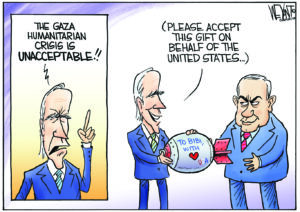A Brief Military History of Israel and a Prediction for the Future
The armies of Israel once fought brilliantly and to the benefit of the state, but more recent conflicts targeting civilians only serve to isolate the country and alienate its most important allies. ChameleonsEye / Shutterstock.com
ChameleonsEye / Shutterstock.com
For more than a half-century, since the United Nations partitioned the British Mandated state of Palestine so as to create a National Home for the Jewish People, in part of what had until the First World War been a part of the Ottoman Empire, the land of Palestine has been dominated by the Zionist founders of what became Israel.
Nearly all the Arab states in 1947-48 fought the partition as an act of aggression, but were brilliantly and conclusively defeated by the improvised military defenders of the new Zionist state. By that victory, Israel seemingly established its permanent place not only in what formerly had been Palestine but within the whole of the Middle East, supported by the United States. This position of permanence seemed guaranteed by America’s support and that of the vast majority of the Western European nations. The Israelis were soon to confirm it themselves with their military triumphs over renewed Arab efforts to expel the Israeli settlers by wars in 1956, 1967, and 1973-74.
A new Israeli attack on Lebanon in 1982 to expel forces of the Palestinian Liberation Organization to other Arab states was successful, but the aftermath — an effort permanently to occupy south Lebanon by mercenaries acting for Israel, failed because of Hezbollah guerrilla operations against the Israeli occupation forces and against targets in Israel itself. The Israeli army completely evacuated Lebanon in 2000.
That was Israel’s first defeat, and it turned the tables in the Arab-Israeli conflict, strikingly enough through acts of hubris by the Israelis themselves. These introduced a new phase into the Israeli-Palestinian conflict in which it was not the Arabs who seemed permanently thwarted, the losers in each of the European and American-sponsored diplomatic undertakings meant to define and install a two-state solution. These invariably ended in impasse, always because of Washington’s insistence that the ultimate settlement terms be convenient to Israel, serving the growing appetite of its right-wing governments to seize and occupy Palestinian lands.
A new phase in the conflict was opened in which an increasingly aggressive Israel presented itself to the Palestinians — and to the world — as internally divided rather than united, uncertain, and weakened, not so much by what the Palestinians had done but by what the Israelis did to Israel and its own interests (and indeed to American interests), especially under the Netanyahu right-wing governments that ruled in 1996-99 and from 2009 to the present — and which hope to rule again after the national elections set for the coming March.
In 2008-09 this period began with the pitiless month-long military assault upon the sketchily-armed and defenseless Hamas-controlled Gaza, directed against the civilian population of the country with the intent of imposing upon them so intense a degree of suffering as to make them reject the intransigent Hamas movement they had elected to govern the Gaza Strip (in defiance of warnings by the Palestine Authority and the Israeli and American governments). The Palestinian population of Gaza instead stoically endured “Operation Cast Lead,” and in the end Hamas claimed victory. It did not look like a victory to anyone else, using military or material criteria. But Israel, in turn, had accomplished nothing. It had morally defeated itself.
It was a defeat of violence as a policy, as had been the invasion of Lebanon in 1982, checked by Hezbollah, and the defeat of Israel’s long occupation of south Lebanon. The first Israeli attack on Gaza came eight years later, responding to deliberately provocative guerilla rocket-fire from Gaza. The next, “Pillar of Fire,” in 2012, again was deliberately provoked. The most recent, following small-scale rocket provocations, killed more than 2,000 Gaza civilians, and was followed by intense foreign criticism and reproach. For Israel, it was futile.
The employment of “shock and awe” military assaults against civilian populations, medical facilities, schools and public infrastructure, as well as UN and foreign NGO facilities, — presumably meant to intimidate Palestinian civilians, and as the American army says, “demonstrate resolve” — provided few if any positive gains and contributed to that foreign political discredit that drives the Israel Boycott Movement. They generated what the Israelis insist on describing as anti-Semitism but is in fact hostility to Israeli violations of international law by its settlement policies and military actions rather than by any hostility to the Jewish people. There is a difference.
These policies have combined with the insolent defiance of Israel’s most important allies, the United States and the West Europeans, to create a situation — now approaching its climax in the Israeli national election in March, and the American presidential and legislative elections in 2016 — that threatens for Israel total isolation from the world of democracies — or as the leader of the Labor Party, Isaac Herzog, has recently said, “an abyss.” They surely lead toward still another war, in which it will have arrogantly discarded all of its friends.
Visit William Pfaff’s website for more on his latest book, “The Irony of Manifest Destiny: The Tragedy of America’s Foreign Policy” (Walker & Co., $25), at www.williampfaff.com.
© 2014 Tribune Media Services, Inc.
Your support matters…Independent journalism is under threat and overshadowed by heavily funded mainstream media.
You can help level the playing field. Become a member.
Your tax-deductible contribution keeps us digging beneath the headlines to give you thought-provoking, investigative reporting and analysis that unearths what's really happening- without compromise.
Give today to support our courageous, independent journalists.






You need to be a supporter to comment.
There are currently no responses to this article.
Be the first to respond.